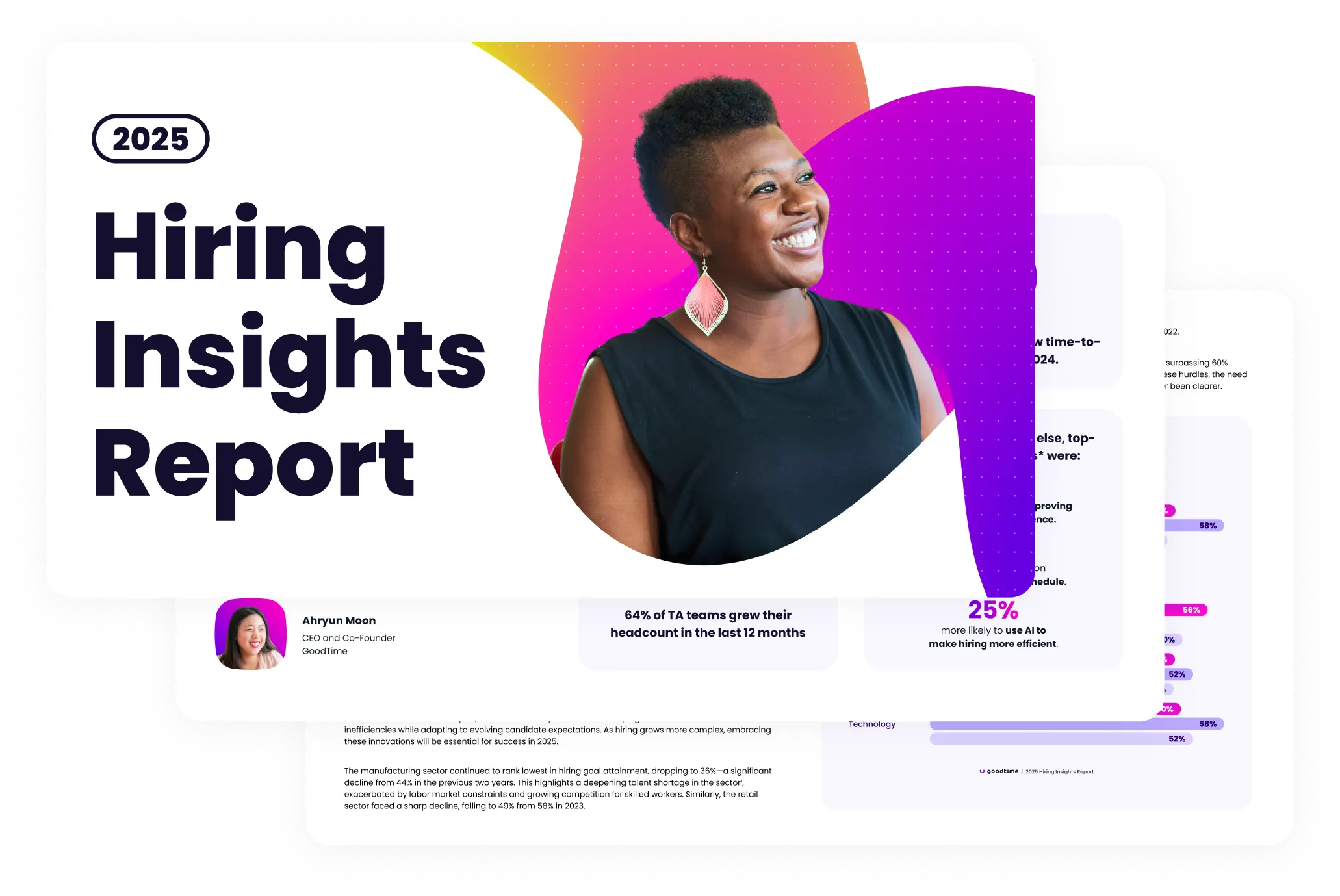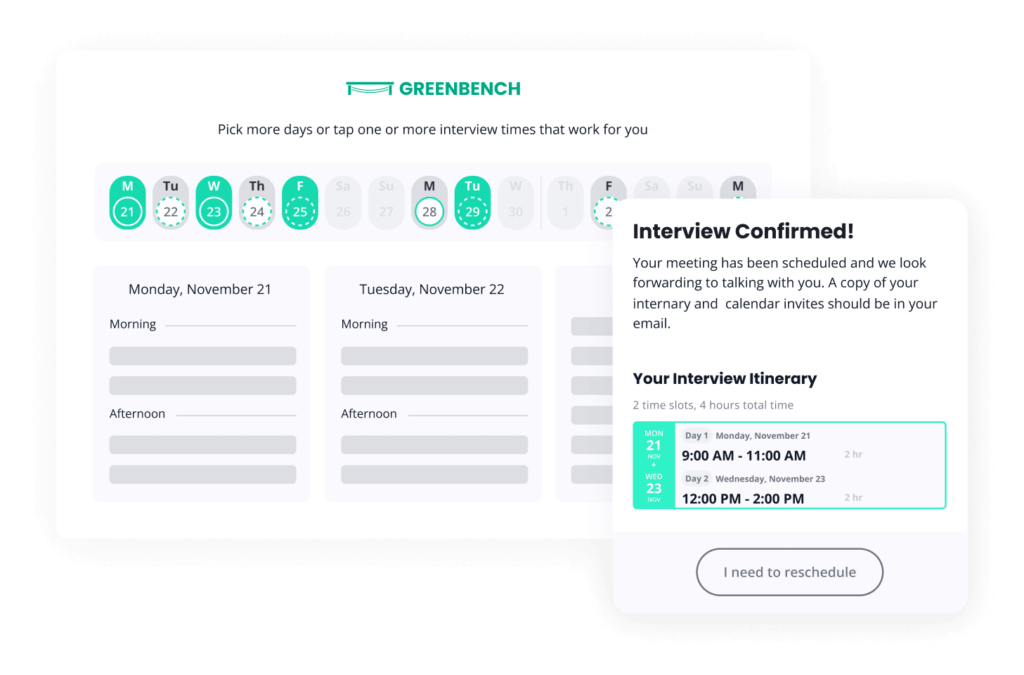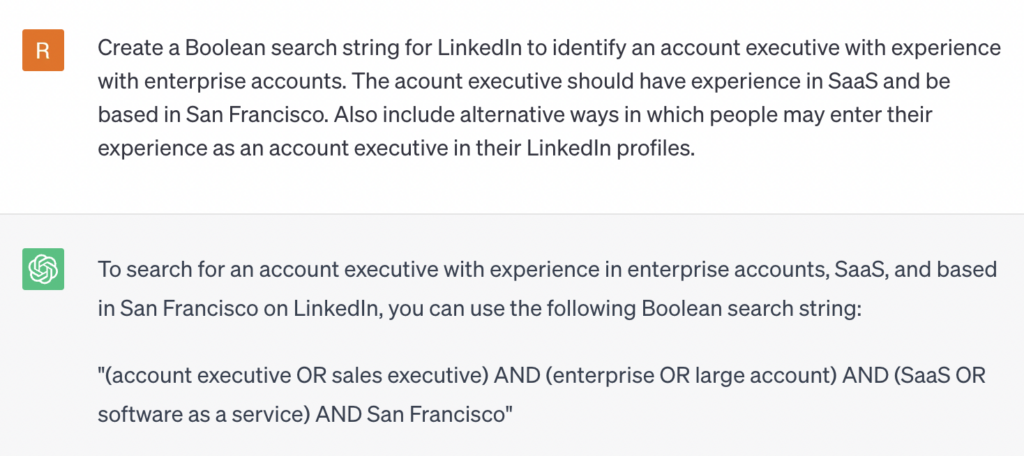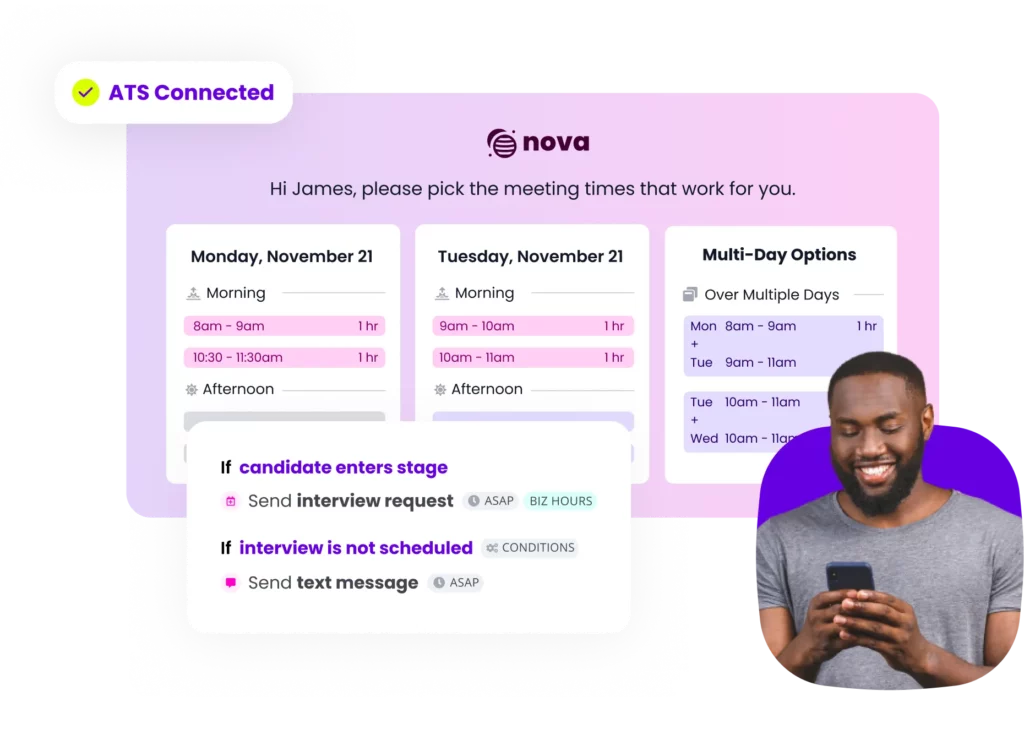Table of Contents
We get it — recruiting teams are going through it. You’re strapped for time and adapting to working leaner with smaller teams and fewer resources. Simultaneously, companies increasingly want to hire unicorn candidates who can do what used to be the job of three different people. It’s a lot.
Luckily, in the same time period with all these shifts, AI recruiting tools arrived to help you adapt. But with all the noise about AI recruiting (and AI in general), it’s tough to know what actually matters. What will help you solve your challenges and what will turn into another big, expensive, time-consuming project?
I’ve got you covered. In this article, we’ll give you a clear-cut rundown on AI recruiting, its advantages and limitations, and how you can use it to help you reach your hiring goals and keep your sanity.

Unlock 2025’s top hiring strategies: Insights from 500+ TA leaders
Be the first to uncover deep hiring insights specific to your sector — straight from the highest-performing TA teams.

What is AI recruiting?
AI recruiting involves leveraging AI-powered tools to automate time-consuming recruiting tasks, extract meaningful insights from large datasets, and make data-driven decisions when managing and evaluating candidates.
In an economic climate that calls for greater productivity, AI recruiting gives your team a much-needed efficiency boost. While AI handles your repetitive and tedious duties like scheduling interviews, sending reminders, and drafting simple messages, you can spend more time on high-value strategic work.
In the video above, we asked Socotra’s Head of Talent Acquisition, Dubi Ben-Shoham, how he’s using AI in his recruiting process today.
Advantages of AI for recruiting teams
In today’s tough hiring environment, recruiting professionals need all the extra help they can get. According to our Hiring Insights Report, organizations hit just 51.5% of their hiring goals last year — a modest lift from the year prior, but still well off target.
But with the assistance of AI, talent teams can effectively course-correct themselves and reclaim their time, energy, and headspace.
Teams who leverage AI recruitment tools are seeing:
- Enhanced efficiency: AI streamlines the recruitment process by automating tasks such as resume screening, interview scheduling, and candidate sourcing. This saves valuable time and allows recruiters to focus on engaging with candidates.
- Reduced recruitment costs: By automating and optimizing your processes, AI helps you make the most of your current resources and reduces your reliance on additional staff. Plus, AI’s ability to accelerate the hiring process and cut down your time-to-hire saves you both time and money.
- Improved quality of hire: AI can analyze vast amounts of candidate data, including resumes, job applications, and online profiles, to identify the most suitable candidates for specific roles. Using AI in the candidate screening and selection process helps improve your quality of hire.
- Less bias: Human bias in hiring can unintentionally influence decision-making and hinder DE&I efforts. AI recruiting helps mitigate bias by relying on objective data analysis and predefined criteria. This ensures a fair and consistent evaluation of all candidates.
- More data-driven decisions: AI enables recruiters to make more informed decisions by extracting key insights from datasets. These insights can reveal patterns, trends, and correlations that might not be immediately apparent from a human perspective. Data-driven decision-making improves the accuracy and effectiveness of candidate evaluations.
Measurable results of implementing AI recruiting
The specific results you can expect depend on your company, your processes, and which AI tools you choose to adopt. But just to give you a taste of the impact recruiting teams are creating with AI, let’s focus on one of the recruiting tasks most ripe for automation: interview scheduling.
By using GoodTime Hire to automate interviews:
- Zoom coordinated five times more interviews per quarter.
- Pinterest reduced their average time-to-fill by 50%.
- Box spent 40% less time scheduling interviews.
- Deliveroo hired 700+ new employees.
Learn how interview scheduling software helps recruiting teams do more with less.
Misconceptions and challenges of AI in recruiting
Now that you understand the potential benefits of AI in recruiting, there are some challenges you should be aware of. But first, let’s clear up some common misconceptions.
Misconceptions about AI
- AI will replace recruiters: Recruiting is a sensitive, human-oriented endeavor, and there’s no removing the humans from that process. AI recruiting tools are designed to help human recruiters by automating and optimizing parts of the hiring process, so they can focus on things like strategic decision-making and candidate engagement.
- AI alienates candidates: When implemented thoughtfully, AI in recruiting actually enhances the candidate experience. AI delivers heightened personalization, efficiency, and speed that provides candidates with a smooth, streamlined process. Plus, with more bandwidth, recruiting teams can refocus on creating memorable candidate experiences.
- AI possesses human-like intelligence: Despite advancements in AI, current AI systems lack true consciousness and human-like intelligence. AI is based on algorithms and data processing; while it can perform specific tasks exceptionally well, it does not possess emotions, subjective experiences, or a comprehensive understanding of the world as humans do.
- AI is inherently biased and discriminatory: AI systems can be biased, but they can also play a crucial role in fighting bias and creating a more equitable hiring process. AI with algorithms that prioritize equal treatment empowers recruiters to make informed decisions based on objective criteria.
Challenges of AI
- Ethical considerations: AI in recruiting raises several ethical concerns, especially around privacy, consent, and the potential misuse of personal data. Be sure to partner with technology providers committed to upholding ethical practices, ensuring the responsible use of AI algorithms, and safeguarding the privacy of personal data collected throughout the hiring process.
- User acceptance and trust: There may be resistance from members of the hiring team and HR leaders to fully trust AI-driven processes. Educating yourself on the benefits of AI and proactively addressing concerns will make you better prepared to advocate for its use.
- Securing buy-in from stakeholders: To gain buy-in from stakeholders, it’s essential to demonstrate the value and ROI of your desired tool. Be prepared to present compelling business cases that showcase how AI can enhance efficiency, accelerate time-to-hire, improve quality of hire, and lower recruitment costs.
AI’s impact on the role of recruiters/RCs
AI recruiting is quickly picking up steam. A SHRM survey found that out of the HR departments that use AI, 79% of them leverage it for hiring. As we start to see AI’s impact on the role of recruiters and recruiting coordinators, we must emphasize that recruiters and RCs remain indispensable.
Human talent acquisition professionals are irreplaceable when it comes to understanding candidate motivations, assessing cultural fit, and making critical hiring decisions. Think of AI as a valuable assistant — not a replacement.
With AI as their ally, recruiters and RCs can navigate the challenging landscape, unlock new possibilities, and make a significant impact. Within all of this, there are several ways that AI impacts the duties of recruiting teams.
Shifting priorities
If anything is certain, it’s that AI will shift the priorities of recruiters and RCs. With AI-powered tools automating everyday tasks, recruiters can redirect their focus to bigger projects. This may include engaging candidates in creative ways, optimizing their talent acquisition strategy, and making more data-driven decisions.
Data analysis and strategy
AI generates a wealth of data throughout the recruitment process. Recruiters and RCs will need to become proficient in analyzing and interpreting this data to gain insights into sourcing channels, candidate preferences, and the effectiveness of their strategies.
As a whole, AI-driven analytics platforms empower recruiters to leverage data for refining their approaches, optimizing hiring processes, and improving overall talent acquisition outcomes.
Human-AI collaboration
As AI takes on administrative and repetitive tasks, recruiters and RCs will find themselves collaborating more closely with AI-powered tools. Specifically, they’ll play a part in managing AI-driven processes to ensure accuracy, fairness, and compliance.
TA professionals will also play a critical role in adding a human touch to AI-powered candidate experiences by designing personalized interactions with candidates, providing support, and addressing any concerns that may arise.
Continuous learning and skill development
To make sure they’re leveraging technology effectively, safely, and fairly, recruiters and RCs need to stay updated on the latest technologies and trends (more on that later).
Understanding the capabilities and limitations of AI in recruitment empowers recruiters to make smart decisions and contribute to the success of their organizations.
Use cases for AI recruitment
AI’s diverse range of applications empower TA professionals to do their best work in the smartest way possible — even with reduced budget or headcount. From streamlining interview scheduling to optimizing candidate sourcing and screening, AI is here to make waves in recruitment.
AI-powered interview scheduling
Few recruiting teams would claim interview scheduling as their favorite activity — and for good reason. Without the help of technology, manually scheduling interviews (and managing reminders, no-shows, and rescheduling) is a time-consuming, headache-inducing task.
But when you combine AI with scheduling, calendar coordination becomes all the more fast and efficient. GoodTime Hire’s Scheduling AI allows TA teams to quickly coordinate the best possible interview time and set of interviewers — no matter the complexity.
With Hire, recruiters and RCs can automate scheduling to meet goals such as reducing time-to-hire, load-balancing interviewers, and increasing candidate and interviewer engagement.

AI-generated job descriptions, candidate communications, and more
If you want to attract the right candidates, you need a compelling and accurate job description. You’ve certainly heard of ChatGPT, the AI chatbot. It can assist recruiters in quickly generating job descriptions that are engaging, informative, and tailored to the right audience.
Asking ChatGPT to write a customized job description allows recruiters to complete what was previously at least a one-hour task in a matter of seconds. Think of ChatGPT as your recruiting sidekick, freeing up your bandwidth by taking tedious work off your hands.
3 more ways to use ChatGPT for recruiting
The use cases for ChatGPT don’t just end at job description generation. Here are several other ways recruiting teams can benefit from the tool:
- Candidate searching: Use ChatGPT to generate Boolean search strings (a search query with specific keywords and phrases that can help you find your ideal candidate)
- Interview preparation: Ask ChatGPT to generate a list of interview questions based on job requirements, candidate profiles, and/or desired skills
- Email communication: Instruct ChatGPT to draft a range of email templates that you can use in different scenarios when communicating with candidates

AI-based candidate sourcing & outreach
Identifying and engaging the best talent from a vast pool of applicants can quickly become overwhelming. That’s where AI-based sourcing and outreach tools come in.
Gem’s talent engagement platform helps to streamline the sourcing process and automate personalized outreach. The product’s AI-powered, auto-generated outreach sequences help recruiters create customized and compelling outbound messages.
AI-enabled background check & screening
A sluggish, inefficient background check and screening process is a major roadblock in onboarding promising talent. AI solutions like Checkr are here to help speed up your team’s workflow.
Checkr uses AI to automate background checks, credential verification, and reference analysis, improving the accuracy and efficiency of screening. With Checkr, talent teams can quickly gather the reliable information that they need to confidently welcome new talent.
How to implement AI recruiting
Nearly 100% of organizations will be using AI by 2025, but successfully implementing AI for recruiting requires a thoughtful approach. After all, every organization is different, every candidate is different, and recruiting is sensitive, important work.
Use these essential steps to guide you through the implementation process:
1. Assess organizational needs and goals
Don’t just embrace AI for AI’s sake. Think about what you actually need to achieve. Before implementing AI in your recruitment process, assess your organization’s specific needs and goals. Identify pain points and areas where AI can make the most significant impact, such as:
- Improving the efficiency of the hiring process
- Maximizing team-wide productivity
- Reducing time-to-hire/time-to-fill
- Enhancing the candidate experience
Aligning AI initiatives with your broader recruitment and business objectives will help ensure a focused and effective implementation.
2. Choose the right AI tools and platforms
The market offers such a wide range of AI recruiting tools that it can get overwhelming. When selecting the AI solution that’s right for you, focus on these factors:
- Features and functionalities that align with your needs
- Scalability for future growth
- Vendor reputation
- Accessibility to customer support
- Compatibility with your organization’s existing integrations
3. Consider data privacy and compliance
As AI in recruitment heavily relies on collecting and analyzing candidate data, it’s crucial to prioritize data privacy and comply with applicable regulations. You want a secure AI recruitment solution that you can trust.
To make this a reality, ask your potential technology vendor about their information security program. This can encompass topics such as data encryption, data privacy, data security, data ownership, and physical security. And depending on your industry, you’ll want to ensure compliance with other regulations, such as HIPAA.
4. Integrate AI with your existing recruiting processes
AI tools should work with your existing processes and platforms. It’s important to define clear workflows and roles for AI tools and recruiting teams, ensuring the most fruitful collaboration between the two.
If you’re a talent/HR leader, provide training and support to your recruitment team to show how AI tools can enhance their effectiveness and enable them to leverage AI to its full potential.
The future of AI in recruiting
AI is rapidly evolving, and several upcoming trends will shape the future of recruiting as we know it. Understanding these trends helps you stay ahead and adapt to the ever-changing landscape.
AI agents
AI agents for recruiting are intelligent, task-driven tools that automate and optimize key parts of the hiring process — from scheduling to candidate engagement — freeing up teams to focus on strategic, high-impact work.
By handling repetitive tasks and personalizing communication at scale, these agents improve efficiency, reduce time-to-hire, and create a better experience for both candidates and recruiters. As AI continues to advance, these agents will become even more adaptive, proactive, and essential to competitive hiring teams.
AI-driven personalization
Recruitment teams are increasingly recognizing the importance of personalization, with AI taking on a key role in delivering tailored, engaging candidate experiences. AI can analyze candidate preferences, behavior, and feedback to provide personalized job recommendations and career guidance.
By leveraging AI to understand the needs and aspirations of talent, organizations can create a more meaningful and personalized recruitment experience. Ultimately, this leads to higher candidate satisfaction and improved talent acquisition outcomes.
Advanced Natural Language Processing
Natural Language Processing (NLP) is a branch of AI that focuses on understanding and processing human language. Advancements in NLP enable AI tools to analyze text-based data more accurately. In the world of recruiting, this includes resumes, cover letters, and social media profiles.
As NLP continues to evolve, recruiters can expect more sophisticated language processing capabilities, leading to enhanced candidate screening, sentiment analysis, and improved candidate matching.
Augmented reality and virtual reality
Combining Augmented Reality (AR) and Virtual Reality (VR) can bridge the gap between a remote hiring process and an in-person job experience. For instance, AI-powered AR and VR experiences can provide immersive simulations of job environments, allowing candidates to experience a virtual workplace and perform tasks relevant to the position.
These engaging, realistic experiences help candidates keenly understand the job requirements, showcase their skills in a true-to-life setting, and provide employers with a robust assessment of their capabilities. In turn, AR and VR assist in attracting top talent and facilitating better hiring decisions.
Upgrade your recruiting process with AI
In short — if you’re wondering what AI can do for your recruiting team, the better question is, “What can’t AI do?”
With AI by your side, you can enhance team-wide efficiency, offload tedious tasks, maximize existing resources, and accelerate progress toward your goals. And when you’re ready to give your interview scheduling process a major AI-powered boost, check out GoodTime Hire.
Hire’s Scheduling AI helps you coordinate 78% faster, hire 50% more efficiently, and 5x team productivity. No simple scheduling tools here.
Discover how GoodTime Hire’s interview scheduling software can supercharge your recruiting process.
Experience AI-powered scheduling for your recruiting team
Lean team? Sky-high goals? No sweat. Secure top talent 50% faster with AI-powered scheduling automation that handles even the trickiest interviews.





